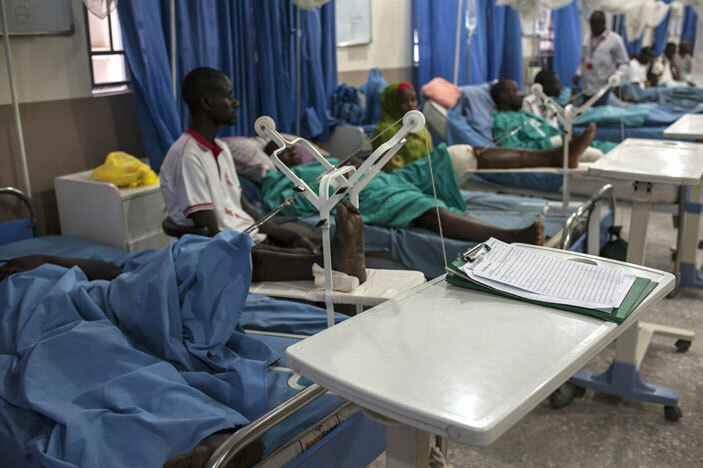Wounded survivors recount botched Nigeria air force bombing
"We first heard the roar of the fighter jet and suddenly there was a huge explosion which sent us running because it was clear the camp was under attack," said Fati Yasin, who is in her 30s.
Four-year-old Kaka-Hauwa Aji shrieked in pain and sweat rolled down her bare torso, as two nurses in crisp white hijabs disinfected a gaping shrapnel wound on her neck.
Her seven-year-old sister, Ya-zahra Aji, lay on the bed opposite, bandages wrapped around her right hand where the shards of molten metal from the off-target Nigerian Air Force bomb pierced her skin.
On Tuesday morning, the girls' mother had left them and their six brothers and sisters in a tent at the camp for displaced people in Rann, northeast Nigeria, to go to a Red Cross food distribution post.
Moments later at least 70 people, including aid workers, were dead and more than 100 others injured.
"We first heard the roar of the fighter jet and suddenly there was a huge explosion which sent us running because it was clear the camp was under attack," said Fati Yasin, who is in her 30s.
"As we ran in all directions we heard a second explosion," she told AFP, her elder daughter now sobbing in pain.
Yasin said she rushed to the tent and found the two girls injured. Their traumatised siblings were crying beside them.
Two strikes
Seven beds in a ward run by the International Committee of the Red Cross (ICRC) at the Borno State Specialist Hospital in Maiduguri were occupied by victims of the bombardment on Wednesday.
 Injured men with treated wounds lay in the Mens's Ward at the Maiduguri State Specialist Hospital on January 18, 2017. AFP Photo / Stefan Heunis
Injured men with treated wounds lay in the Mens's Ward at the Maiduguri State Specialist Hospital on January 18, 2017. AFP Photo / Stefan Heunis
In one, a seven-month-old baby boy lay sedated after being treated for shrapnel wounds to the neck and foot.
Ngwari Mustapha said she was carrying her son on her back and was running from the first air strike when he fell.
"My other child was injured in both legs," she said in the Shuwa Arab language spoken in parts of the far north of remote Borno state near the border with Cameroon and Chad.
"My major grief is that my child was not harmed by Boko Haram but by the military that should protect us from Boko Haram."
Nigeria's military has blamed the air strike on the "fog of war", saying its intended target was Boko Haram Islamist fighters reportedly spotted in the Kala-Balge area, of which Rann is part.
The conflict, which has left at least 20,000 dead since it began in 2009, has also made more than 2.6 million others homeless, leaving tens of thousands in dire need of food, shelter and healthcare.
Doctors Without Borders (MSF), which arrived in Rann last Saturday to conduct vaccination and malnutrition screening programmes, said 20,000 to 40,000 people were living in makeshift shelters there.
None of the medical charity's staff was killed or injured but three aid workers from a Cameroonian firm hired by MSF to provide water and sanitation lost their lives, as did six Nigerian Red Cross workers.
Babagana Mohammed was one of the 11 local Red Cross staff injured. He suffered a broken leg, arm and shoulder.
"Many people were burnt to death and many others were injured," he said from his bed, with his limbs in plaster.
"The jet struck a second time and killed more people and we couldn't distribute the food aid due to the bombardment."
Mass casualties
A total of 74 wounded were evacuated from Rann to Maiduguri in the two days following the bombing, the ICRC said in an update late on Wednesday.
Baba Shehu Mohammed, a surgeon at the Borno State Specialist Hospital, said most have broken limbs, abdominal and chest injuries. Seven have had major operations, he added.
The public hospital had received 38 victims by Wednesday afternoon and 21 were being airlifted from Rann, said ICRC health coordinator Padshah Hashemi Said.
The ICRC runs a 50-bed facility at the hospital that specialises in trauma cases -- the injuries caused by Boko Haram's bombs and bullets.
But the unit was expected to fill up as military and humanitarian helicopters brought in more of the injured. In preparation, the hospital had freed up some of its 500 beds.
Two more hospitals in Maiduguri are treating patients.
Nigeria's military maintains it did not deliberately target aid workers and has called the incident an accident.
A delegation, including President Muhammadu Buhari's chief of staff Abba Kyari and Chief of Army Staff Lieutenant General Tukur Buratai, visited the injured in hospital on Wednesday.
The bombing has sent shockwaves through humanitarian agencies working in the crisis-hit region, potentially straining already tense ties with the authorities who have accused some of profiteering.
Agencies have called for better safeguards for the displaced and protection in the camps across the northeast.